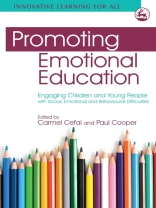Unlike IQ, emotional competence can be nurtured and developed, and is a key factor in physical and mental health, social competence, academic achievement and other aspects in the personal and social development of children and young people.
Promoting Emotional Education connects with the contemporary shift from an exclusively academic focus towards a more balanced and broader approach to education, with an emphasis on both academic and emotional literacy. The book suggests adopting educational practices which encourage feelings of emotional security, promote trusting and supportive relationships and reflect students’ views and feelings; essential qualities for healthy personal and social development in children and young people. The contributors emphasise evidence-based practice, proposing various student-centred and emotion-focused approaches and strategies which have proven to be effective in improving the social and academic behaviour of children and young people with social, emotional and behavioural difficulties. These include student voice approaches, peer-mediated support strategies, personal and social education, nurture groups and aggression replacement training amongst others.
An illuminating read, this book will be of interest to school staff and professionals, psychologists, social workers, health workers, researchers and practitioners and anyone interested in developing innovative approaches to the promotion of emotional education among children and young people.
Jadual kandungan
Introduction. Chapter 1. Emotional Education: Connecting With Students’ Thoughts and Emotions. Carmel Cefai, University of Malta, and Paul Cooper, University of Leicester, UK. Part 1: Listening To Students’ Voices. Chapter 2. The Perspectives of Young People With SEBD about Educational Provision. Frances Toynbee, Huntington School, York. Chapter 3. The Narratives of Secondary School Students with SEBD. Carmel Cefai and Paul Cooper. Chapter 4. The Perspectives of Ex-Students on Their Experiences at a School For SEBD. Damian Spiteri, College of Arts, Science and Technology, Malta. Chapter 5. The Perspectives of Students on Personal and Social Development in School. Mark G. Borg, University of Malta and Andrew Triganza Scott, PSD Teachers Association, Malta. Part 2: Mobilising Peer Support. Chapter 6. Peer Support Challenges School Bullying. Helen Cowie, University of Surrey, UK. Chapter 7. Classwide Peer Tutoring and Students With SEBD. Anastasia Karagiannakis and Ingrid Sladeczek, Both of Mcgill University, Canada. Chapter 8. Students with SEBD as Peer Helpers. Claire Beaumont, University of Laval, Quebec, Canada. Chapter 9. Circle Time and Socio-Emotional Competence in Children and Young People. Jenny Mosley, Quality Circle Time Consultancy. Part 3: Working With Students’ Emotions. Chapter 10. Nurture Groups: An Evaluation of the Evidence. Paul Cooper. Chapter 11. Nurture Groups: Early Relationships and Mental Health. Marion Bennathan, Chair of the Nurture Group Network, UK. Chapter 12. Kangaroo Groups: An Adaptation of Nurture Groups. Caroline Couture, Université Du Québec A Trois-Rivières, Canada. Chapter 13: Aggression Replacement Training: Decreasing Behaviour Problems by Increasing Emotional Competence. Knut Gundersen and Frode Svartdal, Both of Diakonhjemmet University College Rogaland, Norway. Chapter 14. From the Needs of Children to the Need for Children: Contemporary Values and their Implications for the Social and Emotional Well Being of Children. Paul Cooper and Carmel Cefai. The Contributors. Index
Mengenai Pengarang
Carmel Cefai, is Director of the European Centre for Educational Resilience and Socio-Emotional Health and Lecturer in Psychology at the University of Malta. Carmel is also Co-chair of the European Network for Social and Emotional Competence (ENSEC).












